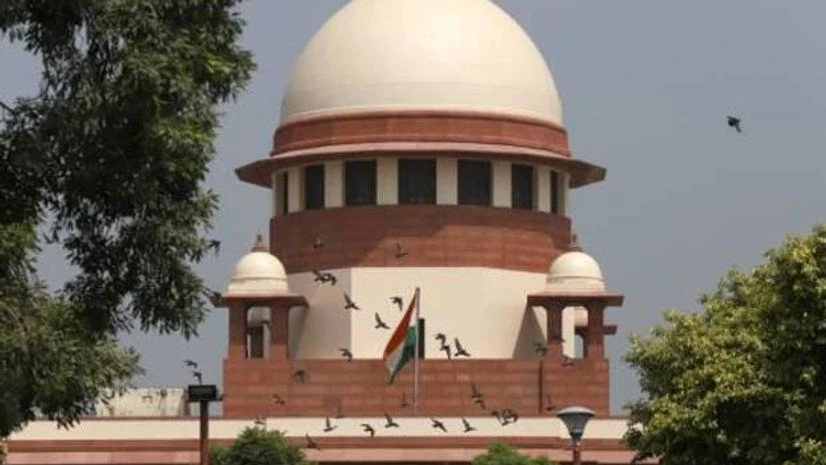The Centre on Wednesday defended the provisions of the Prevention of Money Laundering Act (PMLA) before the Supreme Court and informed the top court that Rs 17,000 crores amount has been restored to victims, especially in bank fraud cases.
However, the petitioner questioned the provisions of the Money Laundering Act and the summoning of a person under the act.
Solicitor General Tushar Mehta, appearing for Centre, apprised the fact to a special bench of three judges comprising Justices Sanjay Kishan Kaul, Sanjiv Khanna and Bela M Trivedi.
He said that as a nation one should be proud of the provision which allows the confiscated property to be restored to claimants with legitimate interest.
"Approximately 17,000 crores have been restored to victims, especially in bank fraud cases," he informed the top court.
However, the petitioner questioned the various provisions of the law.
More From This Section
Senior Advocate Kapil Sibal, representing petitioners in the matter, apprised the court that about the various provisions and said that the Enforcement Directorate summons a person without telling them whether he is being called as an accused or witness in the matter and henceforth the person cannot take the appropriate legal remedy in form of anticipatory bail.
During the hearing, Senior Advocate Sibal said that he has been a legislator for 35 years but never seen such a law. However the court questioned him whether he was in opposition when the law was passed by parliament in 2002
Sibal replied that it may have been amended by one party, but they never envisioned it would be enforced in this way. He called the law dangerous.
He called the provisions draconian and said that under the PMLA provisions, one is not told the reasons and offences for being arrested. He said that even the Enforcement Case Information Report (ECIR) is not known to them.
The senior counsel argued that PMLA is under the FATF scanner of laws being misused to target NGOs and its ambit has been extended to cover even offences not related to drug trafficking, organised crimes, and other serious crimes.
The court remarked that the extension can be made by the legislature and this can be be tested on constitutional parameters.
The court said that it has to examine whether the law is in line with constitutional provisions.
The court was hearing the review petitions challenging the top court's judgement upholding various provisions of the Prevention of Money Laundering Act.
The top court has earlier clarified that would be addressing issues only related to PMLA on certain parameters.
SC had noted the last order on the review petition said that at least two aspects had to be reconsidered. Senior Advocate Kapil Sibal, appearing for the petitioner had said that PMLA is not a penal statute. Senior Advocate Sibal also said that when someone is summoned under PMLA, one doesn't know whether he is summoned as a witness or accused.
Last Year the top court agreed to reconsider the review petition as it said that prima facie two issues relating to provisions of the Prevention of Money Laundering Act need to be reconsidered.
The court had earlier agreed to hear in open court, hearing on the review petition against the judgement pertaining to upholding various provisions of the Prevention of Money Laundering Act.
One of the review pleas was filed by Congress MP Karti Chidambaram.
On July 27, 2022, the Supreme Court upheld the validity of various provisions of the Prevention of Money Laundering Act (PMLA) which empowers ED to make arrests, conduct search and seizures and attach proceeds of crime.
The court had also held that an enforcement Case Information Report (ECIR) cannot be equated with a First Information Report (FIR) and ED officers are not police officers.
The court was hearing various pleas challenging the various provisions of the Prevention of Money Laundering Act (PMLA) on Wednesday.
On March 15 2022 the top court had reserved its order on a batch of petitions challenging certain provisions of the Prevention of Money Laundering Act (PMLA). Prominent names like Karti Chidambaram and former Jammu and Kashmir Chief Minister Mehbooba Mufti were among the petitioners in the case.
Their petitions raised multiple issues including the absence of a procedure to commence investigation and summoning, while the accused was not made aware of the contents of the Enforcement Case Information Report (ECIR).
The top court is considering Section 50 of the Prevention of Money Laundering Act (PMLA), 2002, which deals with the powers of authorities in issuing summons, producing documents, and giving evidence and Section 63
The Centre had justified the constitutional validity of the provisions of PMLA.
Centre has apprised the court that around 4,700 cases are being investigated by the Directorate of Enforcement.
Centre said that PMLA is not a conventional penal statute but is a statute that is aimed at necessarily preventing money laundering, regulating certain activities relatable to money laundering, confiscating the "proceeds of crime" and the property derived therefrom and also requires offenders to be punished by the competent court after filing of a complaint.
Centre submitted that India, and its version of the Prevention of Money Laundering Act, 2002, is merely a cog in this international vehicle. Centre submitted that India, as a signatory to the treaties and an important participant in the international process and the fight against money laundering, is bound legally and morally, to adopt the global best practices and respond to the changing needs of the times.
The PMLA was brought into force in 2005 when the Congress-led UPA was in the Centre.
(Only the headline and picture of this report may have been reworked by the Business Standard staff; the rest of the content is auto-generated from a syndicated feed.)

)
